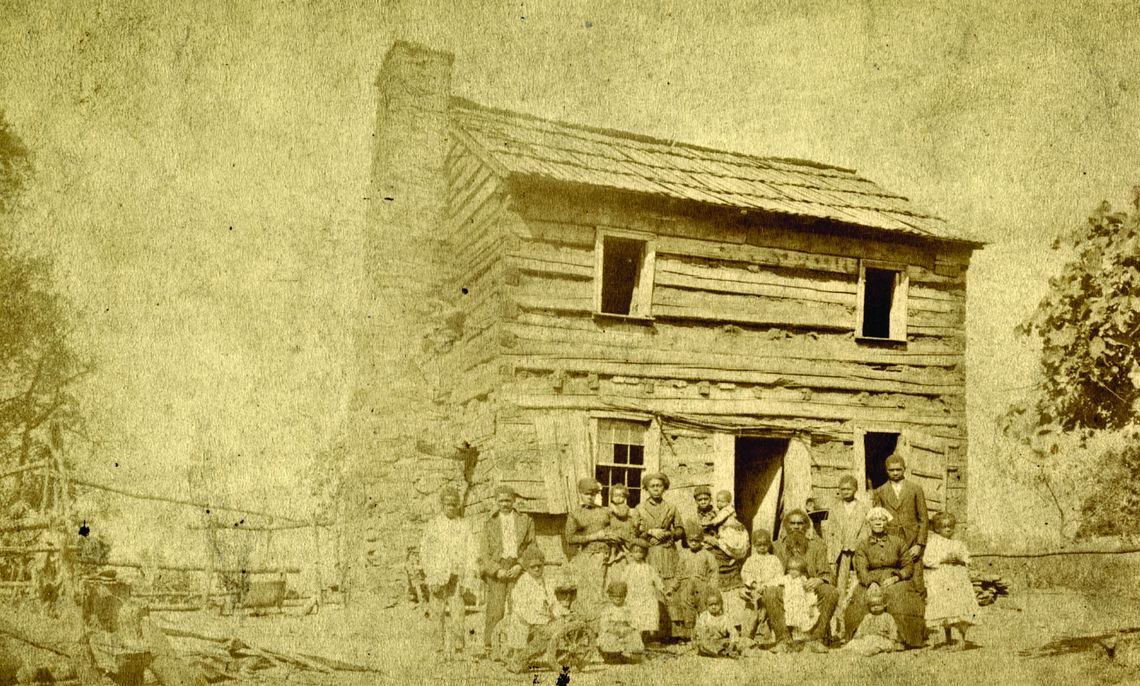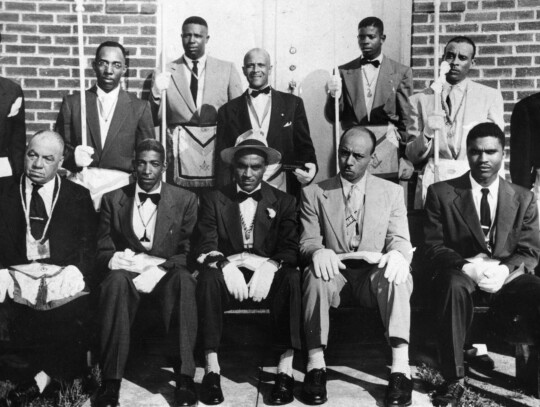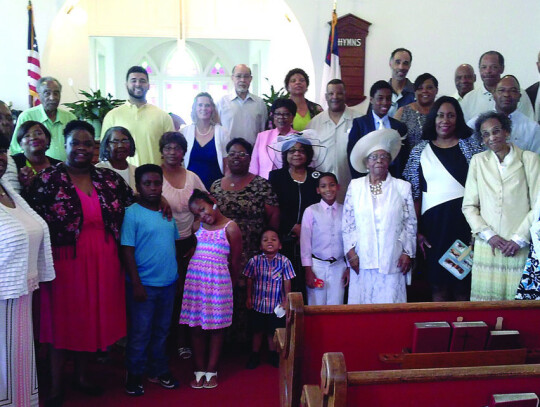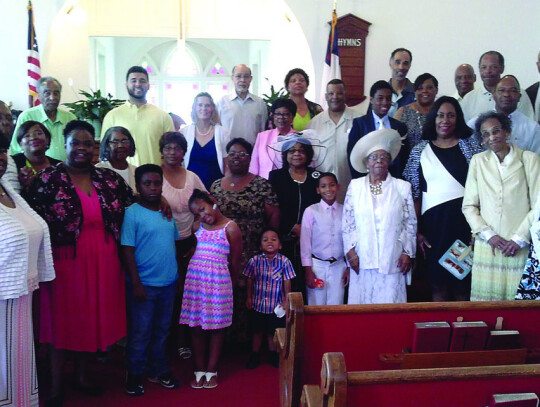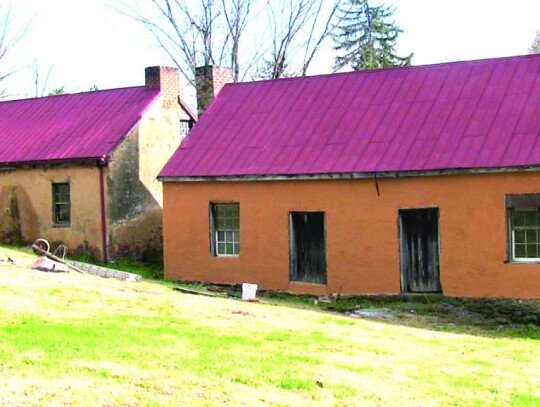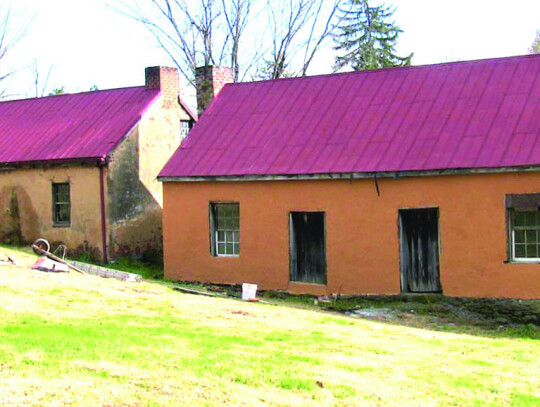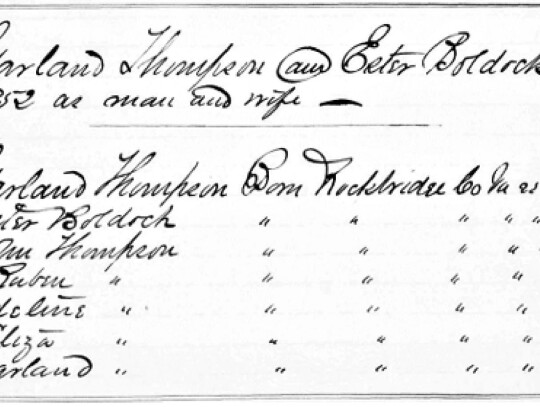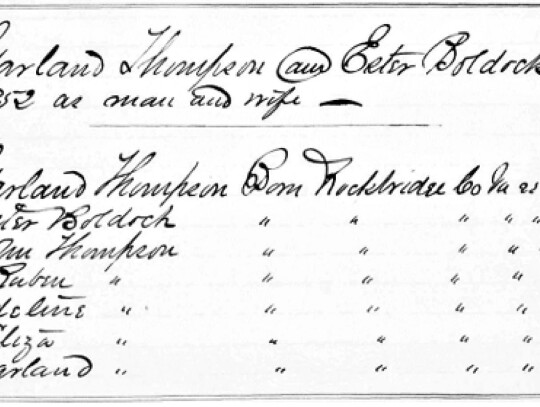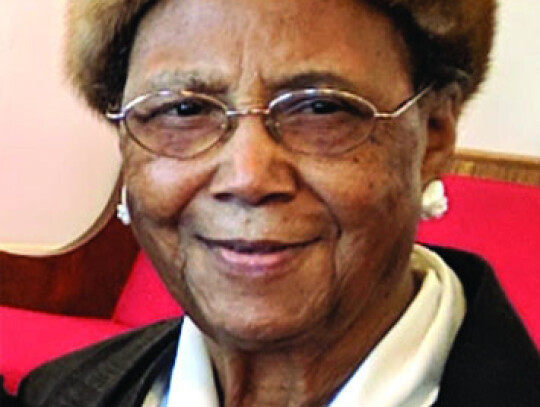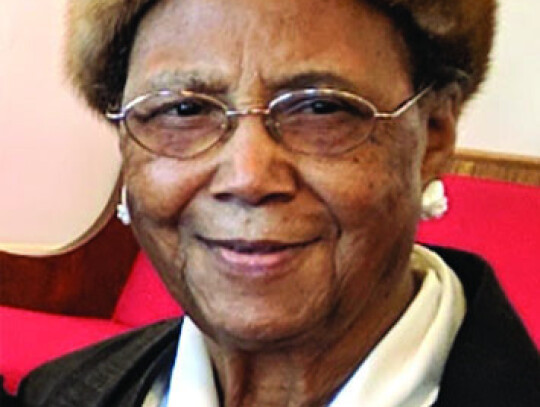Editor’s note: On Saturday, Feb. 18, the Rockbridge Regional Library will host a Black History Month program titled “Bond of Family,” partnering with the Rockbridge Historical Society. The program, running from 1 to 2:30 p.m., will be held Glasgow’s Thompson Community Center at 207 Catawba St. The following feature is written by RHS Executive Director, Eric Wilson. For more, see rrlib.net.
Their eyes – all twenty-four – look right to our own.
In their signal, fraternal leadership, a dozen men from the North Glasgow Masonic Lodge assembled for a benchmark photo in 1950, at the cresting rise of the American Civil Rights Movement. In solidarity and service, these senior and junior officers and members posed for the camera in front of Union Baptist Church, a spiritual and community anchor for many of those gathered, and many more in their broader genealogical and geographical orbits, in Rockbridge County.
At the bottom right sits James E. Thompson Sr., who served as principal of Glasgow’s then-all-Black elementary school. After 1965, he continued to teach in the town’s integrated grade school, and he’s still warmly remembered today by a generation of his students, as well as other elders who continue to describe his influence beyond those walls.
Not incidentally, he’s surrounded here not just by other Masons and fellow congregants, but closer family and a wider web of kin. As identified through our research with descendants still living in Glasgow and Natural Bridge, more than half of these civic leaders descended directly through Thompson family lines, or joined through marriages.
In important ways, these keen eyes also look back to another cluster from Rockbridge history, seen in a Reconstruction- era cabinet card photo taken decades earlier, now part of the Rockbridge Historical Society’s Brady Family Collection and seen now at the top of this page.
Seated in evident pride of place are Ester and Garland Thompson Jr., framed by their cabin at Buffalo Forge. Once at the center of an agricultural and industrial work farm owned by William Weaver and D.C.E. Brady, this newly evolving “homeplace” stood neatly equidistant from the two historically Black churches in the southern stretch of the county that figure distinctly in these sweeps of family and regional history: Union Baptist Church (which united with neighboring Ebenezer Baptist), and First Baptist Church of Natural Bridge, founded in 1865, at the new dawn of freedom.
Garland and Ester’s 1852 marriage registration attests to their commitment and care, through slavery and emancipation alike. As freed people, they continued to earn their living and raise their family on the properties where they’d long worked, lived, and developed abiding ties with others. Although he’d only been freed a year-anda- half earlier, Garland signed a contract with his former owner Dan Brady, on New Year’s Day 1867. The 12month agreement signals his continued value as a trusted “Wagoner & farmhand … for twelve dollars a month & rations … and a house free of Rent.” Importantly, Garland also negotiated provisions for the work of his sons, Jonathan and Reuben, earning new footholds for family security and growth.
Work tools are shadowed to the left of the house in the photo. But the most durable work of their lives, cultivating generational legacies ahead, is strikingly centered in an arc of 20 neatly-dressed children, parents, and grandparents. Already branching broadly here is a family tree – and seed to social networks – that would spread widely, if still locally rooted, into the 20th and 21st centuries.
Telling Their Story
These descendant lines stretch both laterally and lineally to James E. Thompson, great-grandson of the patriarch seated in the photo at the top of this page, himself the son to Garland Thompson Sr. - this eldest ancestral Thompson chosen as the figure to anchor a special Local History Program in the community center that now bears their family name.
James’ own son Jerry Thompson, who helped to re-dedicate that building on Juneteenth 2022, will help to anchor that Feb. 18 program in turn. As a fourth-generation descendant, he will be joined by other relatives, Clarence Martin and Brandall Branch, in an oral history panel that will highlight the diverse legacies and lessons shared, as the past continues to educate the present.
This range of first person- witness will be further highlighted by a special presentation to the Thompson family’s oldest living member, Roberta Branch Lyle, Glasgow native and Lylburn Downing High School class of 1947. Pastors from both noted churches will share their reflections, to bookend the event. Most uniquely perhaps, the program will also riff musically from another multimedia performance in public history, a South Carolina Public Television documentary based on Charles Dew’s iconic book, “Bond of Iron: Master and Slave at Buffalo Forge.” An early version of Dew’s study, shared as an RHS program in 1994, at the historic site itself, can be accessed at RockbridgeHistory. org/Bond-of-Iron.
During this month’s program, fifth-generation descendant the Rev. Brandall Branch will re-visit the documentary’s closing musical sequence, which followed contemporary congregants walking through the doors of Union Baptist Church. Here, once again, featured participants and audience members – several of whom sang for the filming itself -- will gather just down the road, welcome to join the UBC Choir in several songs, including a resonant reprise of the film’s concluding gospel hymn, “We’ve Come a Long Way, Lord.”
For several years, the Rockbridge Regional Library and RHS have collaborated on Black History and Women’s History Month programs. And fueled by December’s wider community-based program on “Glasgow Histories” at Natural Bridge Elementary, and the Juneteenth dedication developed by the Concerned Citizens of Glasgow (another program partner), Branch and RRLIB Local History Center manager Penny Dudley began advancing ideas on how to keep building momentum.
Through continued personal outreach, and partnering research, plans constellated around these distinctive family ties, which could also readily connect and compare with other local voices and legacies, across eras, within and beyond the Thompson lines.
In framing a community program to emphasize descendants’ experience, while also using Garland Thompson Sr. as a core reference point, Dudley reflects on the need to newly pose a related question: “How do you tell the story of enslaved people? As celebrated author Kwame Alexander has just published in his illustrated children’s book, ‘An American Story,’ ‘You tell the story of slavery by being brave enough to lift your voice, by holding history in one hand, and clenching hope in the other. You tell a story about strength and pride and refusing to be broken and refusing to stop smiling and loving.’” Dudley credits Branch’s reverence for his ancestors and positive impact their inheritance still has on their family today, as the inspiration for this program. “At ‘Bond of Family,’ you will hear Brandall and other Thompson descendants share his third-great grandfather’s legacy of pride, strength, resistance, and love.”
When asked about the importance of family witness, himself, Branch echoed the wisdom of Maya Angelou’s famous because forceful line, saying, “If you don’t know where you’ve come from, you don’t know where you’re going.”
If the Thompson family ties provide a certain quilting point, the broader questions that emerge are ones that all of us can pause productively to think on, whatever our ancestry and heritage, homeplace and movement, opportunity and growth.
Within your own family stories: How have your own personal, familial choices and goals been shaped by the model precedent of a particular ancestor, or era? What principles and values have been prioritized in that inheritance? One-fifth of the way into the 21st century, what should our next generations know, and build on? And why?
In gathering this range of family members and community partners, Dudley warmly invites residents all across Rockbridge to join in this unique, timely, intergenerational event.
“This special gathering at this namesake site will not only emphasize the immense importance of family in the enslaved community, but also the lives of their descendants, as we all remember the past, celebrate the present, and dream the future,” she said.
.jpg)
